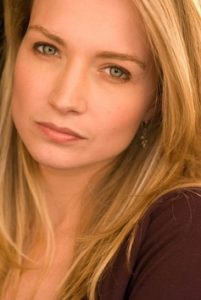The Title Is Misleading, But NVA’s ‘American Hero’ Is Not

Bob (red-shirted Kamel Haddad) wants things done corporate’s way — or the highway awaits Sheri, Ted and Jamie (from left, Cecilia Harchegani, Dallas McLaughlin and Wendy Waddell). Photo by Daren Scott.
In the corporate world, they’re known as executive assistants, or secretaries whose titles outstrip their jobs by about a mile and a half.
And the franchise sub shop has sandwich artists — the drones whose company instruction manual dictates every whit how deeply they can ply their “art” on company time.
Today’s job titles are like participation medals for kids who finish last — bogus tools designed to level everybody’s playing field and wind up doing everything but. That’s part of the point behind Bess Wohl’s American Hero, a professional San Diego premiere currently up at Carlsbad’s New Village Arts.
While the Great Recession-set story is improbable (that’s an understatement), it’s also mistitled (so’s that). There aren’t one but three heroes here (four if you take pity on the corporate schlub who’s about to air his dirty laundry) — otherwise, three fine performances, a sex scene that goes absolutely nowhere and one kick-ass block of character work frame a keenly woven piece for NVA and a nod to what’s popularly known as the American can-do spirit.
There’s Jamie, a snotty thirtysomething divorcee locked in a custody battle; Sheri, a teen who grudgingly works two low-level jobs with her back to the wall; and Ted, a 43-year-old B of A corporate type whose recent layoff sees him move in with his in-laws and has propelled him into the world of minimum wage at a toasted sub franchise. The regional office apparently doesn’t know its right from its left or if there’s even any difference — it leaves the trio to fend for itself when it abandons the venue with no notice and foreign-born owner Bob (a doctor by trade) goes AWOL on grand opening day.
Wohl hasn’t only created disparate characters; she’s knitted them with generous anecdotes in her efforts to define them.
With nothing but their wits and dribs and drabs of customers, they make a go of it, courtesy a bizarre dream that summons dullard Sheri to the task. The place is awash with cheese sandwiches, PB&J fare and signs imploring patrons to sway their anger — more important, the trio achieves a grass-roots solidarity amid its desperation.
Wohl hasn’t only created disparate characters; she’s knitted them with generous anecdotes in her efforts to define them. Would-be rock star Jamie’s custody battle is an absolute matter of life and death amid her poverty and maternal sensibilities; disheartened Ted’s in-laws’ house “smells like milk and Depends”; Sheri, whose salaries pay dad’s med bills, hops to life when her apparition requests a Diet Coke and a “Straw!!” There’s as much showing of this story as there is telling, and as usual, director Kristianne Kurner senses the difference accordingly.
That begs the question surrounding Jamie’s in-store sex romp with Ted. I suppose the hook-up is OK amid its predictability — but Wohl treats it like a gimmick, leaving its aftereffects up in the air once it’s over. And Bob’s absenteeism requires at least some explanation, especially amid corporate’s demand that the venue stay open at all costs. We never get it.
But the performances hold sway, with local veteran Wendy Waddell nicely handling Jamie’s physicality and histrionics in one swoop. Ted is a believable character on paper, but actor Dallas McLaughlin marks him a shade too comfortable in his own skin for Wohl’s apparent taste.
Cecilia Harchegani, late of Coronado School of the Arts and amid the according pedigree, gives Sheri a recalcitrance that doesn’t quit. And where did NVA find Kamel Haddad, who pulls quadruple duty as Bob, an irate patron, the central figure in Sheri’s dream and a frazzled corporate leech? His character work is superior here amid the hair-trigger affectations it requires.

Playwright Bess Wohl knows how to show and tell a story at the same time. Public domain image.
Some passages here seem a little too situational for their own good, but Wohl aptly addresses the bigger picture: The private labor sector always — always — knows what’s best for itself, and the contrarian corporate tools within it be summarily hanged. Eighteenth-century British economist Adam Smith came close to saying as much in his landmark An Inquiry into the Nature and Causes of the Wealth of Nations, wherein he applauded the “invisible hand” as the guiding force in a free-market economy. If you’re interested, the book’s not that long.
Or you could see American Hero instead. It’s shorter (90 minutes) and lots breezier, and its situational high jinks pick up where abstract guys like Smith leave off. Nice.
This review is based on the matinee performance of Sept. 24. American Hero runs through Oct. 15 at New Village Arts, 2787 State St., Carlsbad. $18-$36. 760-434-3245, newvillagearts.org.

Martin Jones Westlin, principal at editorial consultancy Words Are Not Enough and La Jolla Village News editor emeritus, has been a theater critic and editor/writer for 25 of his 47 years…
More…


